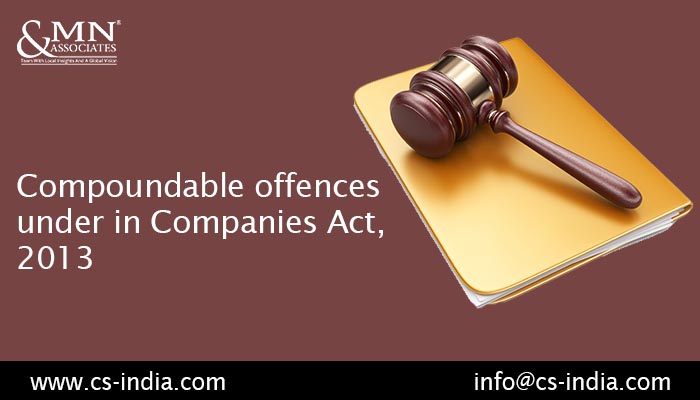
Compoundable offences under in Companies Act, 2013
Offence by companies means a breach of rules, regulations stated under different Acts and Laws as applicable to the company. The non-compliance of legal provisions as specified in the Companies Act, 2013 includes Non-maintenance of Statutory books/accounts, defaults or delays in holding statutory meetings, non-adherence to corporate governance rules, non-compliance of audit, cost rules, labour laws, policies standards, etc.
The Companies Act, 2013 does not state for any specific reason or cause of offence to be punishable or non-punishable or to be recognized or not as an offence by the competent authority. Rather, the act provides only specific guidelines for handling and ways of proceedings with certain offences. Other than this the act on a short note also guides about regulations for compounding of offences by companies or by its representatives.
Compounding Offences by Companies
The Companies Act, 2013 under its Section 441 holds following provisions for compounding of offences committed by companies or by any officer of any company under the Act :
- The defaulting company or the appropriate person/officer of the company in default shall only be liable for four types of punishments: which can either be the imposition of fines, fines or imprisonment, fine with imprisonment or imprisonment only.
- Offences under the first two categories can be compounded while the 3rd and 4rth category offence are not permitted under compounding provisions.
- The Competent Authority(CA) dealing with the compounding of offence shall prescribed on the basis of amount of fine imposed for such offence on the entity or the officer, where offence with a penalty imposed of Rs 25 lakh (As amended with Companies Amendment Ordinance, 2018 ) or below will be dealt with by the Regional Director (cases where penalty amount lies within Rs 50,000 )and above which will be processed by the NCLT (also when penalty above Rs 50,000) (National Company Law Tribunal ) or any specific person appointed by Central government .
| Amount of Penalty | Cases falling under the jurisdiction |
| Upto Rs. 25,00,000
Rs. 25,00,000 and above |
Regional Director
National Company Law Tribunal (NCLT) |
- It is necessary to pass the compounding application to ROC who will become the authorized person to pass the application to the competent authority for compounding NCLT or RD.
- Before initiating the compounding process, it is mandatory to notify the ROC within 7 days.
- No compounding of the offence shall be allowed for the offence committed again or in subsequent nature within 3 years of the previous offence of similar nature already compounded.
- For non-compliance of compounding order issued by Regional Director or by NCLT, the officer or any employee of the company in default shall be punished with imprisonment for a period which might extend up to 6 months or fine up to Rs 1 lakh or both.
Procedure for Compounding of Offence under Companies Act, 2013
To file an application for compounding of offence by the company or any officer in default:
– A meeting of board members has to be conducted. Board will estimate and specify the penalty amount as per relevant section and will issue a resolution to file an application with ROC.
– An application then shall have to framed by the company or person in attestation of the person in default according to CLB Regulations
– Then application as in format prescribed prepared in FORM GNL-1 shall have to be filed with ROC.
– Enclose necessary documents being MOA, AOA, Financials of the entity, Petition documents, Board resolution or documents as prescribed, etc.
– On receipt of the application, the ROC shall accept or reject the application, on acceptance; it shall be forwarded to the concerned authority for hearing.
For compounding of the offence of similar nature applied before the concerned authority ROC restricts the applicant from filing any such application.
Required DSC Services? Need consultation on TDS Filling? cs-india.com serves you with all required compliance solutions related to corporate structuring, business incorporation, tax filling, intellectual rights, FEMA, RBI, etc.
Email us your concern at info@cs-india.com
